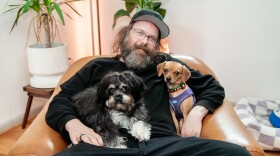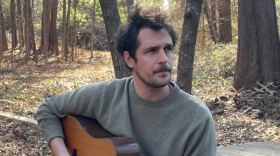If you ever came across African diasporic music in North Carolina with live drums — like, djembes, dununs, shékeres — then there's a good chance master drummer Baba Bradley Simmons was involved.
Simmons was a veteran instructor of West African and Afro-Cuban percussion at Duke University's Music Department for nearly three decades.
He died in Durham on May 22. He was 73 years old.
A towering figure with a commanding presence and a warm Brooklyn accent, Simmons was Duke University's resident African drumming master for nearly three decades.
There, he taught generations of students the secrets of the West African djembe and dun dun drums, the Afro-Cuban conga and cencerro, or cowbell, as well as challenging Haitian rhythms.
In the drumming and African dance world he was known as Baba Bradley — Baba being a term of respect to elders in West African traditions — and he made West African and Afro-Caribbean music a discipline to be revered at Duke.
Born in 1951, Baba Bradley was a part of the legendary old guard of African American musicians in New York City who reconnected with their African roots and made African dance music popular in the West.
As part of his musical trajectory, Baba Bradley held a deep knowledge of the music to honor the orishas, the deities central to the Lucumí spiritual tradition brought to the U.S. through Afro-Cuban migration nearly a century ago.
The conga, shékere and religious batá drums that he was an expert of are central to the Yoruba and Lucumí religious traditions.
In New York, he came up learning from African American drum legends like Chief James Hawthorne Bey — who played on the pioneering Olatunji record "Drums of Passion" — and Afro-Cuban masters like Julito Collazo, who recorded with mythical stars like Dizzy Gillespie, Tito Puente and Celia Cruz, among others.
He began drumming at age 9, after his mother encouraged him to learn music and dance so as to stay away from trouble. He recalled that his mother first took him to the Gloria and LeRoy Jackson School of Dance in his native New York City.
From there, his storied history began: going on to perform in legendary dance schools like the LaRocque Bey School of Dance in Harlem, the Alvin Ailey American Dance Theater and more, performing in classes where modern dance icons like Pearl Primus and Katherine Dunham were involved.

On Broadway, he performed in the musical "Timbuktu" with Eartha Kitt and Melba Moore, as well as "Guys and Dolls", "Reggae" and others.
Baba Bradley's Afro-Cuban expertise also brought him to Latino audiences, performing with salsa orchestras and Cuban rumberos.
He moved to Durham in the 1990's through his close musical colleague, the African dance legend and Raleigh native, the late Baba Chuck Davis, as well as Khalid Saleem, a fellow North Carolina master in the West African musical tradition.
In Durham, he was director of percussion for Baba Chuck's African American Dance Ensemble from 1993 to 1996, joining Duke in 1998.
"Our community depends on him in so many facets, as a teacher, as a mentor, as a guide, as instructor, as a peer," said Andrea Woods-Valdés, chair of the Duke University Dance Program.
A scholar and dance professor, Woods-Valdés knew Baba Bradley through their shared history with the shékere, the most popular gourd instrument of West African origin.
"He was a teacher, a scholar, a spiritual person — so many facets to one person," she said.
Preserving African folklore
It was on Duke's campus and off-campus in cultural spaces like the Living Arts Collective where Bradley would teach the foundations of instruments like the shékere, the djembe, the conga and the dunun.
"Nobody came to school knowing what a djembe was, nobody came to school knowing what a conga was, or that they wanted to play it," says Atiba Rorie, Baba Bradley's near-lifelong student and professional percussionist. "That aspect alone impressed people, because he was a good teacher, especially getting those folks to a performance level."
Rorie is dance music coordinator at the University of North Carolina at Greensboro's School of Dance, and says it was Baba Bradley who encouraged him to seek a music degree.
Baba Bradley was a rigorous, strict teacher. That's because of the history behind the movement to preserve African heritage, said Rorie.
"At the beginning of this [music], people were doing it not for fun, but because it was rediscovering something about themselves," he said. "It was the idea of 'I am not a slave.' The African American story in America often begins with slavery, not where the slaves came from or were taken from, right?"
Baba Bradley's teaching created a cycle of students who would begin the class in their first year, then continue until graduation, Rorie said.
And he did so despite the odds — since he lacked a formal master's or doctoral degree in music, Baba Bradley was a part-time, adjunct professor in his career. For many years, he worked busy jobs on Duke's campus during the days, and taught percussion in the evenings.
One of his longtime students without a music major was Charlie Hearon.
"I often mentioned to others that my new teacher could seem fiery or harsh at times," Hearon recalled. "But that he was a true player, a master of his instruments, that I wouldn't wish to have it any other way. He’d had a front row seat witnessing the arrival and spread of African, Afro-Cuban, and Afro-Caribbean traditions previously unknown to most in this country."
A "wealth of knowledge"
"At a professional level, or at a certain level, you couldn't touch a hand drum, or call yourself somebody who played a hand drum, and not know him," says Brevan Hampden, a well-known percussionist and teacher in the Triangle's jazz and Latin scenes.
Hampden, jazz drumset instructor and Latin jazz ensemble director at the University of North Carolina at Greensboro, began studying with Baba Bradley as a child.
Hampden credits his teacher with being able to meet Rorie, his childhood friend and bandmate in local salsa acts Orquesta GarDel and Conjunto Breve.
"When an elder transitions, a library disappears," said Hampden. "He was and is a wealth of knowledge. A wealth of knowledge, and a wealth of experience. He was a father figure to a lot of us, you know, I looked at him as like an uncle."
Through his teaching on and off campus, Baba Bradley offered rare musical wisdom as a result of what was carefully taught to him over decades.
The closest most college students in North Carolina could get to folkloric Black music is a Jazz program, Hampden said.
"To have somebody like Baba Bradley, who is certified in the street like that, because that music comes from the street. You don't learn that music in a classroom," he said.
In his death, the world lost a master drummer of a carefully preserved tradition.
But for all who knew him, Baba Bradley will always be present each time the drums call, and the dancers respond.
A celebration honoring Baba Bradley Simmons’ life and music will be held on Saturday, June 14, 2025 at 2 p.m. at the Hayti Heritage Center, located at 804 Old Fayetteville Street in Durham.







